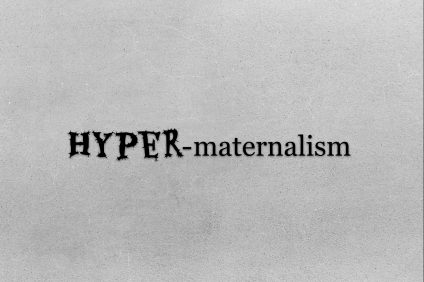
Why do good mothers feel so bad?
It’s not an accident. It is a product of our beliefs about women.
While many of us proudly declare ourselves feminists, we have failed to question fundamentally anti-feminist beliefs about motherhood, sacrifice and how the differing needs of women and children ought to be negotiated. We don’t question them because we have been socialized to believe that children’s happiness and success can only be purchased with the coin of maternal suffering. That belief, along with our intense love for our children, has been used to control us.
[pullquote align=”right” cite=”” link=”” color=”” class=”” size=””]Why do good mothers feel so bad?[/pullquote]
This mothering ideology, the dominant mothering ideology in contemporary culture, is often described as natural mothering or attachment parenting, but I’d like to suggest a new — more accurate, less romantic — term: hyper-maternalism.
Natural mothering and attachment parenting are really marketing terms designed to romanticize maternal suffering and hide the true purpose: manipulating women. They are deliberately misleading; natural mothering, although often presented as a recapitulation of mothering in nature, bears little resemblance to the way our foremothers cared for their children. Attachment parenting is meant to evoke attachment theory, but actually has nothing to do with it. It problematizes mothering by presenting the mother-infant bond not as spontaneous, as has been understood throughout history, but as fragile and contingent on specific ritualized behavior like “baby-wearing.”
What was mothering really like in nature?
Women have always been integral to the survival of small hunter-gatherer bands. They spent hours each day as the gatherers. They spent additional hours laboriously preparing food (grinding grain, for example) and may have sewed the clothing that allowed humans to expand into colder climates. In a very real sense, mothering was an interstitial task, taking place in the gaps while performing other tasks that required attention and energy.
Hyper-maternalism, in contrast, imagines mothering performed instead of other tasks. It is not something that you do while doing everything else; it’s something you do to the exclusion of everything else. It is not natural; it has nothing to do with the way our foremothers raised children, but rather it is an unnatural exaggeration of specific tasks of mothering. Nothing illustrates this better than our cultural pre-occupation over working mothers vs. stay a home mothers. Working is often presented as slighting the traditional role of mother when the reality is that up until the last 200 years or so, all mothers were working mothers.
Hyper-maternalism always and inevitably means more work for mothers, and often more suffering, too. It is the mothering equivalent of the feminine mystique postulated by Betty Friedan.
In her book, The Feminine Mystique:
Friedan shows that advertisers tried to encourage housewives to think of themselves as professionals who needed many specialized products in order to do their jobs, while discouraging housewives from having actual careers, since that would mean they would not spend as much time and effort on housework and therefore would not buy as many household products, cutting into advertisers’ profits.
Hyper-maternalism has also spawned an industry of books, classes, services and specialized products to perform natural mothering, while simultaneously discouraging mothers from having actual careers. That must be discouraged since it would lead to two outcomes the industry considers undesirable: women would not buy the books, classes, services and specialized products and women would acquire economic freedom from manipulation.
Similarly, attachment parenting has nothing to do with the way our foremothers raised their children. The mother-infant bond, to the extent that it was considered at all, was assumed to be the inevitable result of caring for children; mother and child love each other simply because they belong to each other. But in attachment parenting, mothering isn’t enough; hyper-mothering is required. Attachment parenting advocates insist that mother-infant interactions must be prodded and controlled in a series of ritualized behaviors (skin to skin at birth, breastfeeding only, baby wearing) otherwise children will presumably end up “detached.”
As Charlotte Faircloth notes in the essay The Problem of ‘Attachment’: the ‘Detached’ Parent in the book Parenting Culture Studies:
It hardly seems controversial to say that, today, we have a cultural concern with how ‘attached’ parents are to their children. Midwives encourage mothers to try ‘skin-to-skin’ contact with their babies to improve ‘bonding’ after childbirth, a wealth of experts advocate ‘natural’ parenting styles which encourage ‘attachment’ with infants…
Previously a mother’s love for her child had been romanticized and ascribed to inherent characteristics of women, mother love has now been medicalized, requiring participation in rituals prescribed by experts.
Ultimately hyper-maternalism is a more accurate description of contemporary mothering ideology because it captures the belief that mere mothering is not enough; hyper-mothering is required. Women must erase themselves and embrace their own pain, exhaustion and battered mental health. Women must submerge their identities in mothering, ignoring their own intellect, talents, needs and ambitions. The alternative is implied to be beloved children profoundly damaged by our selfishness.
Why do good mothers feel so bad?
It’s not an accident. It’s a direct result of the ideology of hyper-maternalism.

